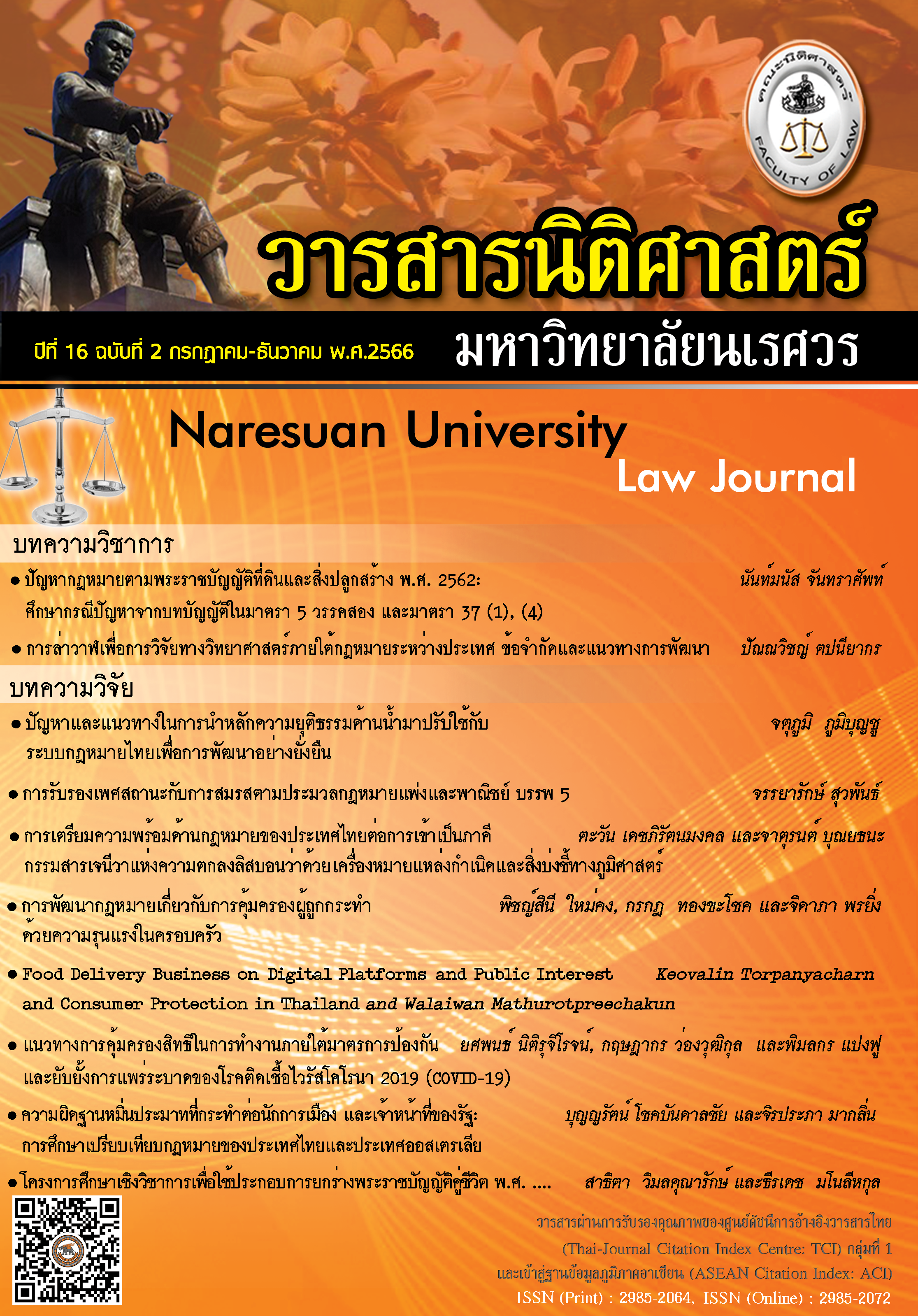Food Delivery Business on Digital Platforms and Public Interest and Consumer Protection in Thailand
Main Article Content
Abstract
This research aims to study concepts, theories, and regulations of food delivery business on digital platforms. It includes the comparative study of international regulations under World Health Organization (WHO), foreign laws, namely, the United States of America, Australia and People’s Republic of China related to legal measures on consumer protection on food delivery businesses. The study also analyzes the limitations and legal problems under Thai laws and propose the legal measures more clearly about rights, duties, responsibilities and sanction for the relevant parties of the food delivery businesses on digital platforms to protect the public safety and consumer rights in Thailand, The study employs a qualitative method with in-depth interview and group discussion. The research finds that the selected foreign laws provide that food providers and restaurants are responsible for public safety and must ensure food hygiene and safety. However, Thai laws lack such legal measures. Therefore, Thai laws and regulations on public safety and consumer protection on food delivery businesses on digital platforms should be amended. Moreover, the system management of the service providers, rights, duties, responsibilities and sanction of the relevant parties should be obviously imposed as well.
Article Details
References
Baiter, Willem H., Richard Lago, and Nicolas Stern. “Promoting an Effective Market Economy in a Changing World.” Accessed May 12, 2021. http://eprints.lse.ac.uk/3740/.
Carrillo, Wendy. “Third-Party Food Delivery Platforms: Food Safety.” Carrillo, Wendy. Last modified September 18, 2020. Accessed May 12, 2022. https://openstates.org/ca/bills/20192020/AB3336/.
Kasikorn Research Center. “Food Delivery Year 2022 Continuously Expanding: Application Service Providers Advance into Other Provinces to Broaden Their Customers Base.” Accessed May 12, 2022. https://www.kasikornresearch.com/th/analysis/k-econ/business/Pages/Food-Delivery-z3289.aspx.
Plachaipiromsilp, Suchada. “Usages Trend of Mobile Application.” Journal of Executive 31, no. 4 (2011): 110-115.
Safework NSW. A Guide to Managing Work Health and Safety in the Food Delivery Industry Gosford, NSW: NSW Goverment. Accessed May 12, 2022. https://www.safework.nsw.gov.au/__data/assets/pdf_file/0020/1004645/a-guide-to-managing-whs-in-the-food-delivery-industry.pdf.
Shoemaker, Roger. Communication of Innovations: A Cross–Cultural Approach. New York: The Free, 1978.
U.S. Food & Drug Administration. “Fsma Final Rule on Sanitary Transportation of Human and Animal Food.” Last modified September 12, 2018. Accessed May 12, 2022. https://www.fda.gov/food/food-safety-modernization-act-fsma/fsma-final-rule-sanitary-transportation-human-and-animal-food.
U.S. Food & Drug Administration. “New Era of Smarter Food Safety.” Accessed May 12, 2022. https://www.fda.gov/media/139868/download.
Wachiraporn, Kladcharoen. “Legal Problems Regarding the Business of Food Delivery Service Application.” Accessed May 12, 2022. http://www.lawgrad.ru.ac.th/tractsFile/6124011316/161406304643cef74819f8de2acc8385fa177a2217_abstract.pdf.
Yotkaew, Pramote. “Digital Marketing and Lifestyle Changes in Thai Society “, Journal of Multidisciplinary Academic Research and Development 3, no. 1 (2021): 18-19.


